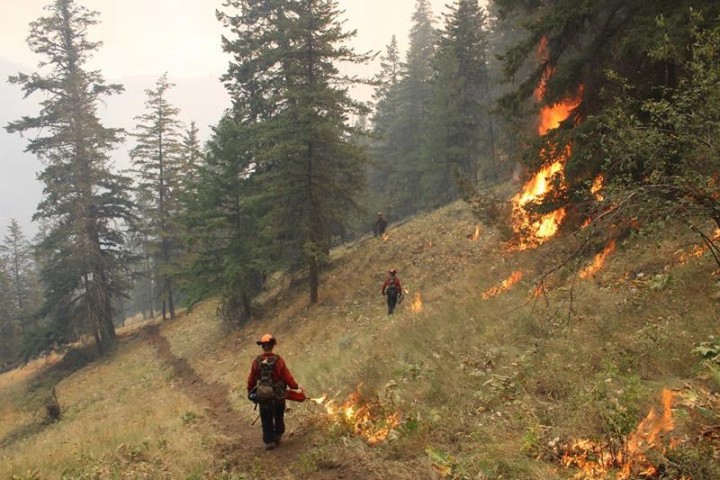KEREMEOS, B.C. — Shifting wind patterns Friday put several communities in British Columbia’s southern Okanagan on edge as an out-of-control wildfire forced the evacuation of the community of Olalla, while residents of the nearby village of Keremeos were told to prepare to leave.
Winds in the area are known to change constantly and their unpredictability has firefighters and emergency officials preparing for the worst, said Tim Roberts, the area’s elected regional director.
“We are always under the risk of Mother Nature, so it’s always good to be preventive, prepared for the worst and hope for the best,” he said in an interview. “As the name states, the (Indigenous) name for Keremeos means valley of the three winds. So you can tell, winds change hourly.”
Much of wildfire was concentrated in steep, mountainous terrain on Friday, and was less threatening to Olalla’s estimated 400 properties, but that could change, Roberts said.
“It’s a very unpredictable fire in regard to winds and terrain,” he said. “You’re looking at very steep inclines, bluffs, heavy timber cluster up in the mountainside.”
He said the fire’s growth remained static on Friday, but weather patterns could change that.
The evacuation orders and alerts were issued late Thursday by the Regional District of Okanagan-Similkameen as the 51-square-kilometre wildfire flared in what fire information officer Bryan Zandberg said is a “problematic corner” of the blaze.
He said the 50 km/h wind on Thursday forced them to issue the evacuation alerts and orders.
“What we were experiencing was quite challenging. Things did get pretty hairy along the 3A,” Zandberg said during a briefing on Friday.
Winds have been pushing flames downhill toward the communities and the flare-up has forced the closure of Highway 3A, which passes through Olalla and Keremeos.
Zandberg said nearly 400 firefighters are working on the blaze, including additional crews assigned late Thursday who will work to protect threatened properties.
The fire is one of 146 that the BC Wildfire Service reported over the past week, although new fire starts have dipped in the last two days due to slightly cooler, calmer conditions.
Environment Canada is forecasting a return to temperatures in the 30s this week and gusty winds could complicate firefighting efforts, but there’s no sign of the lightning storms that have kindled many recent wildfires.
The BC Wildfire Service said this week that the province is expected to experience sustained wildfire activity in August and September, especially in southern regions, with a long-range forecast of hot, dry weather.
The wildfire service said six blazes are currently ranked as wildfires of note, but overnight rain helped crews working to contain two of them.
Wildfire service spokeswoman Roslyn Johnson said 10 millimetres of rain drenched the three-square-kilometre fire burning in grassland hills just north of Kamloops, reducing it to a smoulder.
The roughly 10-square-kilometre fire not far outside Pavilion near Lillooet also received about 16 millimetres of rain Thursday, which the wildfire service said will reduce behaviour and growth of those flames until at least Tuesday.
Other fires of note include a 37-square-kilometre blaze west of Lytton, where the wildfire service said cooler weather has “diminished” its activity.
One of two fires in the Southeast Fire Centre has grown after working into inaccessible terrain south of Cranbrook, but the other, south of Kaslo, has seen little change in the last day.
This report by The Canadian Press was first published Aug. 5, 2022.
The Canadian Press
Related






























